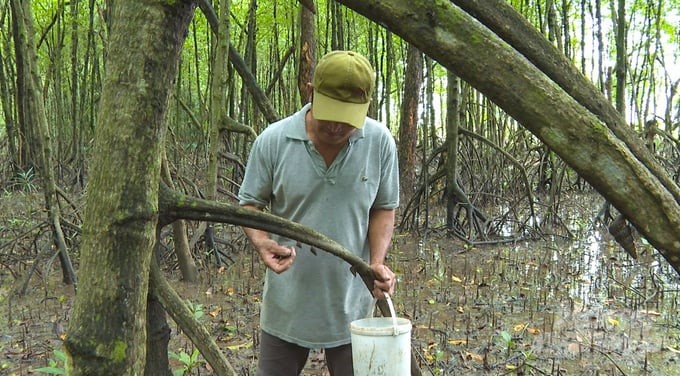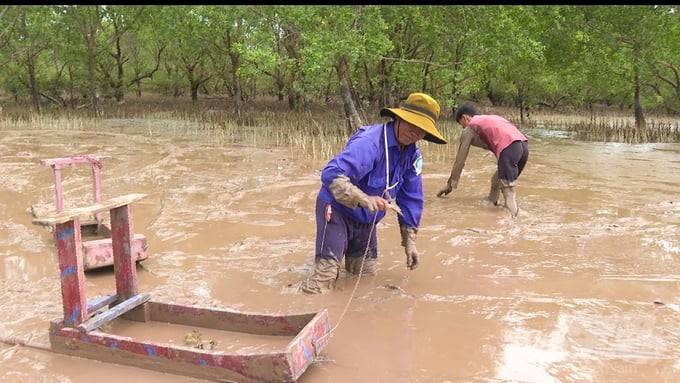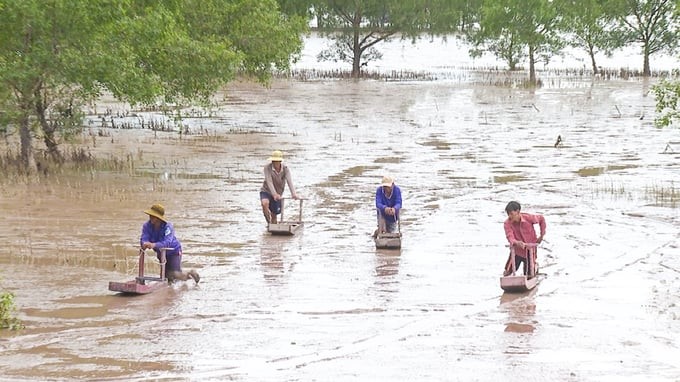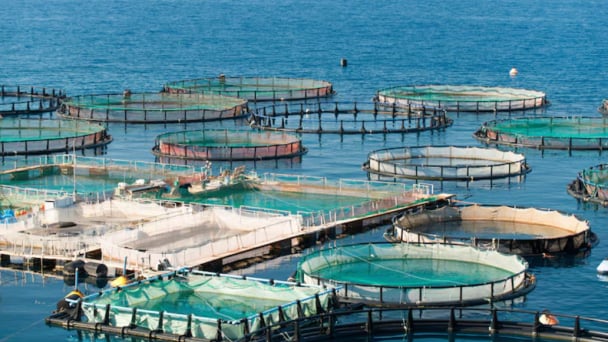June 4, 2025 | 12:37 GMT +7
June 4, 2025 | 12:37 GMT +7
Hotline: 0913.378.918
June 4, 2025 | 12:37 GMT +7
Hotline: 0913.378.918

People harvest wool snails in the protective forest in An Thanh 3 commune, Cu Lao Dung. Photo: Kim Anh.
From the livelihood support model under the project “Mekong Delta Integrated Climate Resilience and Sustainable Livelihoods” (WB9) piloted in An Thanh 3 commune, Cu Lao Dung district, Soc Trang province in 2019, up to now, the locality has formed and replicated more aquaculture areas under the forest canopy.
In particular, co-management groups were established to both protect forests and develop aquaculture. Typically, the model of raising wool snails and sesarmid crabs of the co-management group in Vo Thanh Van hamlet, An Thanh Nam commune, or the model of raising wool snails, sesarmid crabs, and giant mudskippers in the forest management and protection group in An Quoi hamlet, An Thanh 3 commune, etc.
People in these co-management groups are well aware that when forests develop, aquaculture conditions will expand, and income will also increase. Since then, people's awareness and responsibility have changed markedly. People have coordinated with localities to participate in patrolling and protecting farmed aquatic species.
The forest area along the alluvial flat in Mo O hamlet, Trung Binh commune, Tran De district, is home to many aquatic species that appear seasonally, such as blood cockles, gray eel-catfish, giant mudskippers, etc. The majority of people's income sources here are associated with coastal exploitation and fishing. Therefore, developing aquaculture under the forest canopy is essential to reduce the exploitation and catching of natural aquatic resources while still ensuring a stable livelihood and income of several hundred thousand dong per day.

Fishing at the alluvial flat in the Mo O protective forest area, Trung Binh commune, Tran De district. Photo: Kim Anh.
Through the sharing of some households here, the developed forest has created a natural growing space for aquatic species. Everyone agrees and contributes with co-management group members so that the forest trees can grow and develop.
Along the length of the coast of Soc Trang province, as of now, five groups have been formed to co-manage fisheries and protect aquatic resources in association with the protection of protective forests. The groups were established based on the spirit of volunteerism and commitment to implementing seafood exploitation in accordance with regulations. This force becomes the core of helping the agriculture sector disseminate and mobilize fishermen to exploit and catch seafood reasonably on fishing grounds.
Mr. Lu Tan Hoa, Deputy Director of the Soc Trang Provincial Fisheries Sub-Department, acknowledged that in order to exploit and protect aquatic resources more effectively, co-management models must be applied throughout the province’s entire coastal waters. At the same time, it is necessary to have the involvement of relevant agencies to promptly support the group's activities in the process of patrolling, controlling, and handling violations in seafood exploitation activities.
In addition, localities need to continue to develop and support livelihoods for fishermen in coastal areas to reduce economic dependence on exploiting natural aquatic resources. From there, well mobilize the community's strength in the work of protecting coastal aquatic resources in association with protecting the province's coastal protective forests.

Co-management groups actively participate in protecting protective forests in association with protecting aquatic resources under the forest canopy. Photo: Kim Anh.
In recent times, the protection of coastal beneficial resources associated with the protection of protective forests in Soc Trang province has positively contributed to the work of stabilizing livelihoods and preventing natural disasters for the fishing community.
Facing the challenge that coastal aquatic resources are encountering excessive and destructive exploitation and gradually losing the ability to self-regenerate and recover, the establishment of coastal fisheries co-management groups is truly necessary and has become a solution to help protect fishing grounds.
This is also an opportunity to restore order in seafood exploitation in coastal waters, creating good conditions for coastal aquatic resources to be restored and developed.
The project “Mekong Delta Integrated Climate Resilience and Sustainable Livelihoods” (WB9) aims to enhance tools for climate-smart planning and improve climate resilience of land and water management practices in selected Mekong Delta provinces.
The project consists of five components. The first component is enhancing monitoring, analytics, and information systems to undertake ‘smart investments’ and cope with anticipated wide-scale environmental changes. The second component is managing floods in the upper delta to protect the benefits of controlled flooding measures and increase rural incomes in An Giang, Kien Giang, and Dong Thap provinces. The third component is addressing the challenges related to salinity intrusion, coastal erosion, sustainable aquaculture, and improved livelihoods for communities living in the coastal areas of Ben Tre, Tra Vinh, and Soc Trang provinces. The fourth component is addressing the challenges related to coastal erosion, groundwater management, sustainable aquaculture, and improved livelihoods for communities living in the coastal areas of Ca Mau, Bac Lieu, and Kien Giang provinces. The fifth component is supporting project management and capacity building.
Translated by Huyen Vu Thu

(VAN) Technology is redrawing the map of Vietnamese aquaculture: more modern, greener, and more sustainable.

(VAN) Novel process harnesses machine learning to reveal groups of genes that determine how efficiently plants use nitrogen.

(VAN) Several scientists and farmers are experimenting with soil treatment in some key durian-growing regions such as Cai Lay (Tien Giang), Dak Song, Gia Nghia, and Dak R’lap (Dak Nong).
/2025/05/25/4127-3-073637_820.jpg)
(VAN) Thanks to the promotion from an FAO-implemented project, vegetable production in greenhouses in Moc Chau has seen strong development, from 1.5 hectares in 2021 to nearly 50 hectares in 2024.

(VAN) FAO has recently supported USD 140,000 to implement the project 'Risk mitigation human-animal interface risks through disease control initiatives in pig farming.'

(VAN) The People's Committee of Tra Vinh province has approved an adjustment to the investment policy for the Green Hydrogen Plant project, increasing its area to approximately 52.76 hectares.
![Reducing emissions from rice fields: [2] Farmers’ commitment to the soil](https://t.ex-cdn.com/nongnghiepmoitruong.vn/608w/files/news/2025/05/05/dsc08881jpg-nongnghiep-140632.jpg)
(VAN) Clean rice cultivation model in Thuong Tan commune, Bac Tan Uyen district, is assisting local residents in achieving sustainable agriculture by substantially reducing costs, increasing productivity, and protecting the environment.